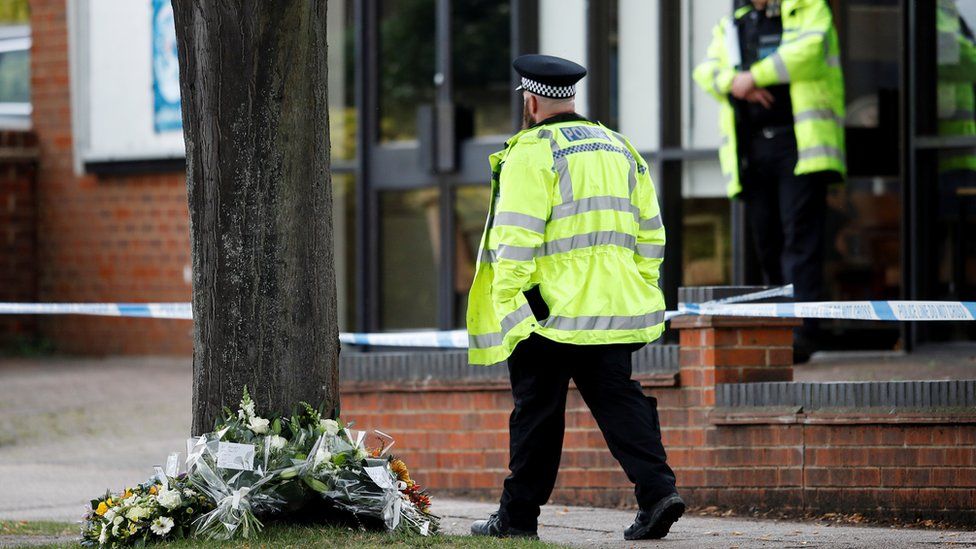Sir David Amess: Prevent scheme needs urgent work, says Robert Buckland
- Published

The government's Prevent scheme - which aims to stop people becoming terrorists or supporting them - needs urgent work, the former justice secretary has said.
Robert Buckland said there needs to be more of a "joined up" approach to monitor individuals.
It has emerged that the man suspected of killing Sir David Amess had been referred to Prevent some years ago.
The scheme is already being reviewed to ensure it is "fit for purpose", Home Secretary Priti Patel said.
The Prevent scheme is part of the government's overall counter-terrorism strategy. It aims to reduce the terror threat to the UK by stopping people from being drawn into terrorism.
In the year to March 2020, just over 6,000 people were referred to the Prevent scheme in England and Wales, because of concerns they were at risk of radicalisation.
Once someone is referred to the scheme, an assessment is made about whether further action is needed.
In some cases - about 11% of referrals - the person is placed on the government's Channel scheme for support such as mentoring. The most common referrals to Channel were for right-wing radicalisation (43%), followed by Islamist radicalisation (30%), in the year to March 2020.
Engagement in the Prevent scheme is voluntary and it is not a criminal sanction.
The BBC understands that Ali Harbi Ali, the man arrested by police following the murder of MP Sir David on Friday, had been referred to Prevent some years ago.
However, it is thought Mr Ali, 25, did not spend long in the Prevent programme, and he was never a formal subject of interest to MI5.
Speaking to Times Radio on Sunday, Mr Buckland - who was the government's justice secretary until September - said he thought there needed to be more cooperation between agencies.
"I very much hope that when it comes to community supervision and community involvement with people like this particular individual, that it is much more joined-up between health services, education, whatever it might be, who have had some involvement with that individual in the past," he said.
"And I think that that element of being joined-up is what we really need to work on urgently."
Asked how agencies might work more closely, Mr Buckland said: "There may be records or information from schools or colleges or from the health service which can tell us much more about individuals and their activities.
"I think we need to join this up much more effectively because what we're talking about here is community prevention.
"We've got to make sure that every arm of the state is absolutely working together in order to understand as much as possible about these individuals."
Earlier, Home Secretary Ms Patel said that Prevent was being independently reviewed "right now".
The independent review began earlier this year and is being led by William Shawcross, the former head of the charity watchdog the Charity Commission.
"It's timely to do that, we have to learn, we obviously constantly have to learn, not just from incidences that have taken place but how we can strengthen our programmes."
She added: "We want to ensure that it is fit for purpose, robust, doing the right thing. But importantly learning lessons, always building upon what is working and addressing any gaps or issues where the system needs strengthening."
- THE CURRENCY OF COMMUNITY?: Will shopping at black-owned businesses make a long-term difference?
- HIDDEN GIRLS: Investigating the shocking extent to which teenage girls are being exploited by gangs
Related Topics
- Published17 October 2021
- Published17 October 2021
- Published18 October 2021
- Published16 October 2021